It was just after midday at the riverside community of Playas del Cuyabeno when the mob attacked.
A British man was said to have been dragged out of a police station in Ecuador, taken out into the street and ‘set on fire until he died’.
Police said Michael Hann had been arrested for his own safety earlier that day, on April 20, after being ‘beaten by local residents’ who accused him of a fatal shooting.
Such stories have become commonplace in the country, which only a few years ago was one of the safest in Latin America.
Authorities have lost their monopoly on violence, pitting the state against vicious gangs, cartels and, in some cases, even residents undeterred by threat of prison.
With violence spiralling, the government has borrowed from the playbook of Nayib Bukele, the strongman ruler of El Salvador whose brutal crackdowns on gangs have horrified global onlookers.
But Ecuador’s gangs, strengthened by drug money from neighbouring Colombia, are far more resilient than those to the north, and even prison guards have their price in a country riddled with corruption.
In only a few short years, peace has made way for an imported normalisation of beheadings, car bombs, public hangings and hostage taking. On Valentine’s Day, a man gunned down had his head cut off and sent to his wife, his heart cut out and sent to his parents, according to police.
President Daniel Noboa has not given up yet, carrying out almost nightly raids on gang strongholds and showing off impressive hauls of guns and drugs designed to assure the public. His show of resistance helped secure an historic re-election in April.
But in an increasingly insecure country, with no clear clear path to recovery, there is still no sign that Ecuador is any closer to ending the scourge of lawlessness and disorder blighting its streets.
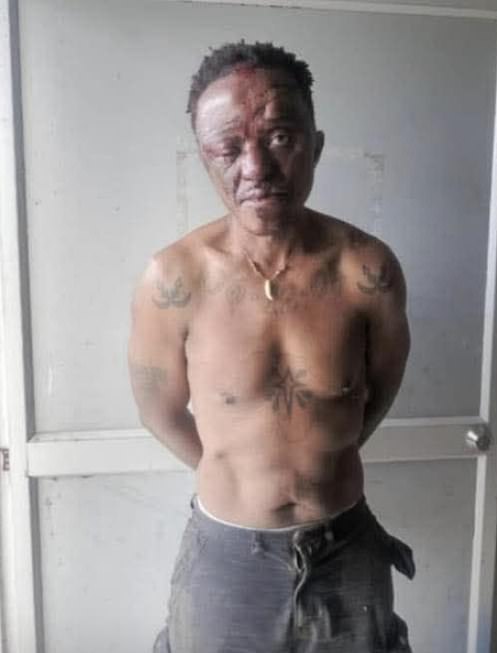
Hann (pictured) was dragged from a police station by an angry baying mob and burned alive
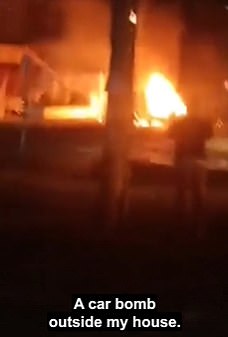
Residents have not been spared from the violence gripping the nation
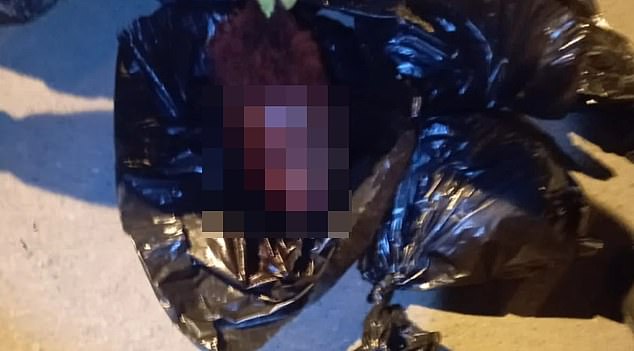
A trio of severed heads are found wrapped in black bags after a cartel killing spree
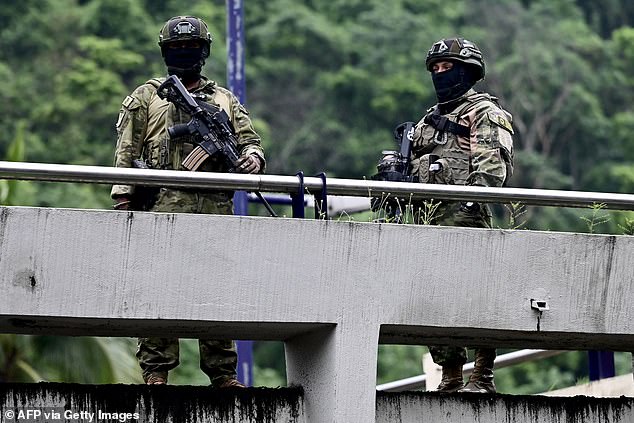
Security forces stand guard at a polling station during the presidential runoff election in Guayaquil, Guayas province, Ecuador, on April 13, 2025
‘Ecuador is changing,’ President Daniel Noboa assured his supporters in his victory speech last month after securing re-election.
‘Ecuador has already chosen a different path. And that path will allow our children to live better lives than we did.’
Such words carry weight in a country worn down by half a decade of brutal gang violence.
In 2019, it was one of the safest countries in the region, with a homicide rate of 6.7 per 100,000 people.
By comparison, the U.S. had a homicide rate of 5.0 per 100,000 in the same year, according to the FBI. Mexico’s was 29.31.
But growing demand for drugs, including cocaine, in foreign markets has galvanised Ecuadorian gangs, resulting in larger – and bloodier – turf wars.
These clashes have seen the homicide rate inflate rapidly in recent years, with local estimates suggesting this had risen to 45, or even 47, per 100,000 by 2023.
The country had been rocked by a spate of bombings, kidnappings and attacks on civilian infrastructure as rival gangs compete with each other and the state for influence in an increasingly weary nation.
Civilians are not exempt from the attacks; in April 2023, nine victims, aged 28 to 79, were gunned down in broad daylight at a fishing port in Esmeraldas. Government officials said rival drug pushers were the likely targets, probably shot for not paying protection money.
The same month, the bodies of three women – aged 19, 21 and 22 – were found dumped in a shallow grave in the city, apparently tortured and with their throats slit after disappearing on a beach trip. Relatives said they did not believe the killings were linked to drug trafficking.
A month prior, three severed heads were found wrapped in black bags. One was still a teenager, his devastated mother said, tasked with identifying the remains.
Other gang members have been publicly hanged and left on bridges as a warning to rivals.

Women murdered in Esmeraldas in April 2023 were identified as (left to right) Yuliana Macias (21), Denisse Reyna (19) and Nayeli Tapia (22)
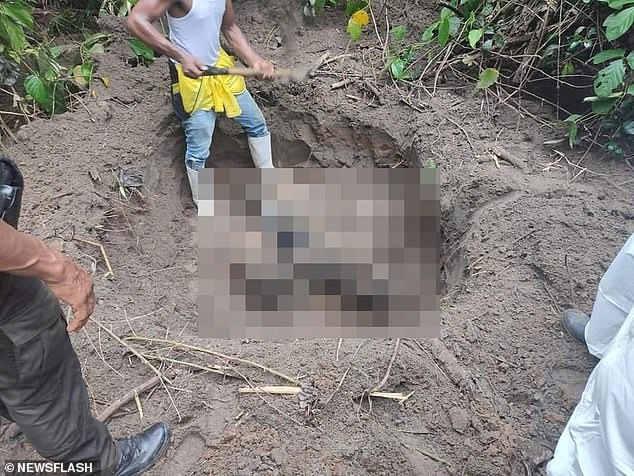
The bodies of girls found murdered on the banks of the Esmeraldas River, Ecuador
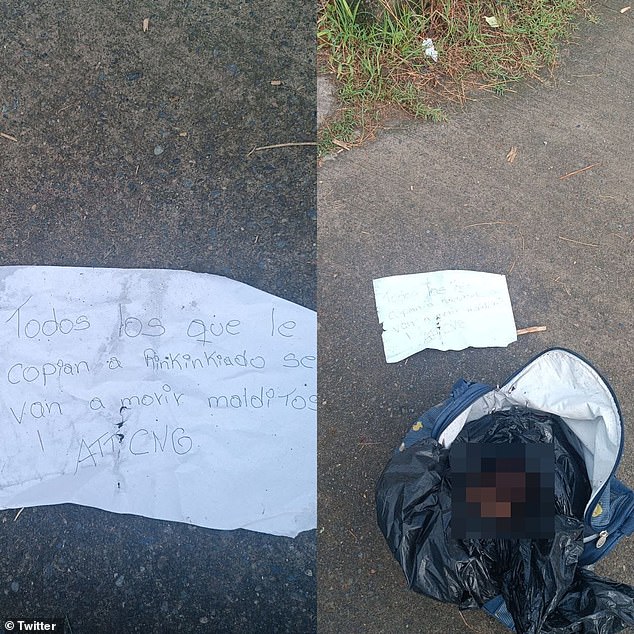
A blood-soaked head is found in a bag alongside a hand-written warning message, seemingly from the Mexican Jalisco New Generation Cartel, in the Ecuadorian city of Esmeraldas
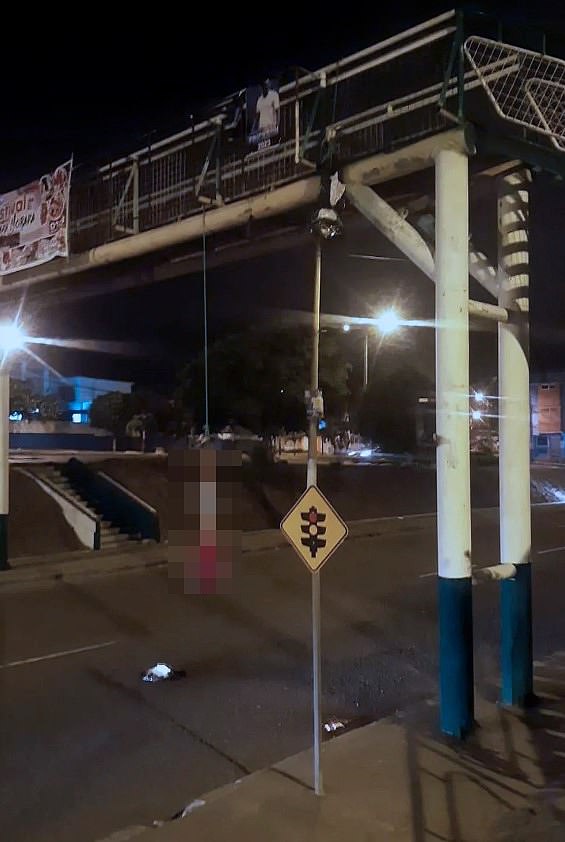
A body left to hang in Esmeraldas was low enough to hit cars passing under the bridge
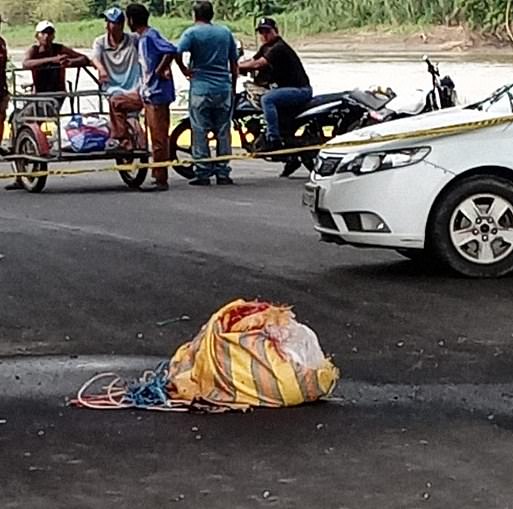
A bag of human remains was found having fallen from a rope suspending it from a bridge in the city of Quevedo
While running on a centrist platform, Noboa risks falling victim to the allure of populism in his bid to wrestle back control.
His promises for growth are said to be overstated, public spending has soared – and now he seeks to spend $52 million on a mega prison for the country’s worst offenders, mirroring’s El Salvador’s descent into an unending ‘state of emergency’.
Noboa will point to his success in bringing down the homicide rate, which fell to 39 per 100,000 in 2024. But that progress had been largely undone by the turn of the new year, with recorded killings reaching record highs January and February.
In March, at the height of the run-up to the election, at least 22 people were killed in the key port city of Guayaquil after rival trafficking factions exchanged shots.
Guayaquil has borne the brunt of the violence, strategically situated on the Babahayo River with access to the South Pacific Ocean — useful for moving drugs to the United States.
Gun battles broke out across the northern neighborhood of Nueva Prosperina on March 6 between members of criminal group Los Tiguerones, one of the most powerful gangs in the country.
‘The problem is that they know each other, they know where they live, and they’re fighting over who has power over that territory,’ local police chief Pablo Davila told reporters.
Images and videos posted on social media showed several heavily armed men running around the district during the violent attack.
Police launched an offensive in response, carrying out around 200 searches and seizing guns and ammunition. Fourteen people, including two minors, were arrested in the area.
But police are doubtful their raids have all that much impact.
‘We can take these guys off the streets but there will be two more outfits that spring up in their place,’ one officer said as suspects were led away.
Noboa, then seeking re-election, said military and police officers would be allowed to respond to the violence in Guayaquil without fear of being punished for acting with a heavy hand.
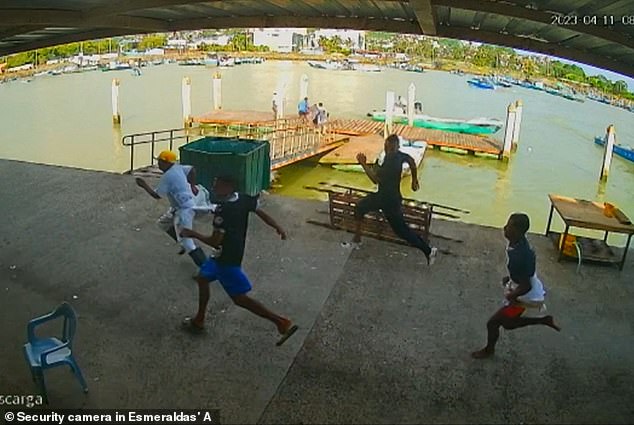
CCTV video footage in Esmeraldas’ Artisanal Fishing Port showing people running after armed men fired on the port in Esmeraldas, Ecuador on April 11, 2023
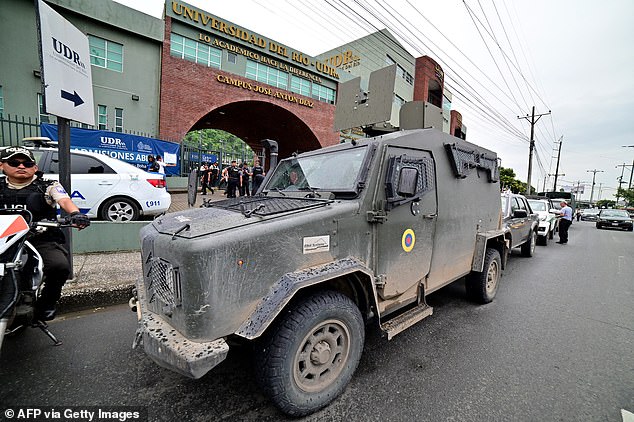
A military vehicle stands guard at a polling station during the presidential runoff election in Guayaquil, Guayas province, Ecuador, on April 13, 2025
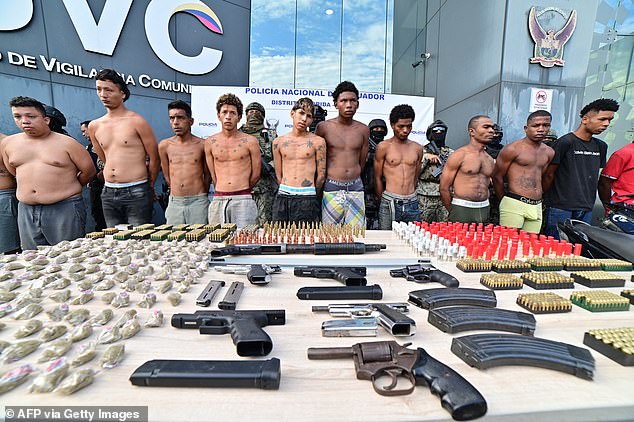
Detainees, weapons, drugs an ammunition are presented to media members after an operation carried out in the neighborhood where at least 22 people were killed on the eve in Guayaquil, Ecuador, on March 7, 2025
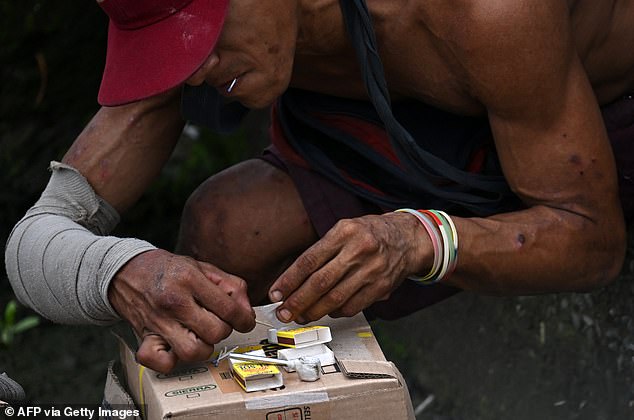
A man prepares bazuco, a low cost drug derived of processing cocaine, in Guayaquil on April 11, 2025
The gangs, considered terrorist groups by the government, operate with little regard for such threats.
Police are underprepared and underpaid, unwilling to enter some neighbourhoods. And with the backing of established Mexican gangs, few targets are off limits for the gangs.
In June last year, an Ecuadorian MP was murdered outside a circus in the city of Manta during a livestreamed interview.
Cristhian Nieto, 34, was gunned down with his wife as he ushered children towards their seats, after telling a journalist how happy he was that his event had been a success.
It was not immediately clear who shot Nieto. Local media referenced the sprawling crime epidemic and gangs linked to the cocaine trade, as well as the shooting of the mayor of San Vicente Brigitte García in March that year and the assassination of the mayor of Manta Agustin a year before.
Gangs also assassinated presidential candidate Fernando Villavicencio in August 2023, and set off car bombs in front of government buildings.
Foreign targets are no safer. In December 2023, a former British consul and his Colombian mistress were snatched outside Guayaquil by Los Tiguerones, bundled into his car and taken to a remote farm in the countryside.
The gang members demanded millions from Colin Armstrong, then 78, before freeing partner Katherine Paola Santos, now 30, to deliver a phone to his son for negotiations.
Ms Santos was fitted with what she believed was a bomb vest and told that if she went near a police station it would detonate. She was left to deliver the phone to Mr Armstrong’s son, Nick, who had replaced him as consul.
Mr Armstrong told The Times this week that he had no idea whether he would survive the ordeal. He had read recently of a kidnap victim losing fingers. When his captors asked if they had tracking implants (to deter kidnap), he feared they might ‘produce a razor to find out’.
Hostage negotiators worked carefully in the delicate hours that followed to keep Mr Armstrong alive and bring down the ransom. Mr Armstrong promised he would pay out, and was eventually freed ‘by a roadside near a brothel’.
Police picked him up from the scene and he was taken to see a doctor, ‘in pretty good shape’, considering. Police chief Cesar Zapata said the motive for the crime was ‘economic’ but he would not indicate how much, if any, of a ransom was paid.
Officers said they confiscated a huge stash from the gang during a raid, including five grenades, six firearms, 1,500 cartridges, 30 detonating fuses – and ‘several kilos’ of controlled substances.

Colin Armstrong, then 78, and partner Katherine Paola Santos are pictured together in Jamaica


Footage showed Ms Santos having an explosives vest removed by a bomb disposal expert
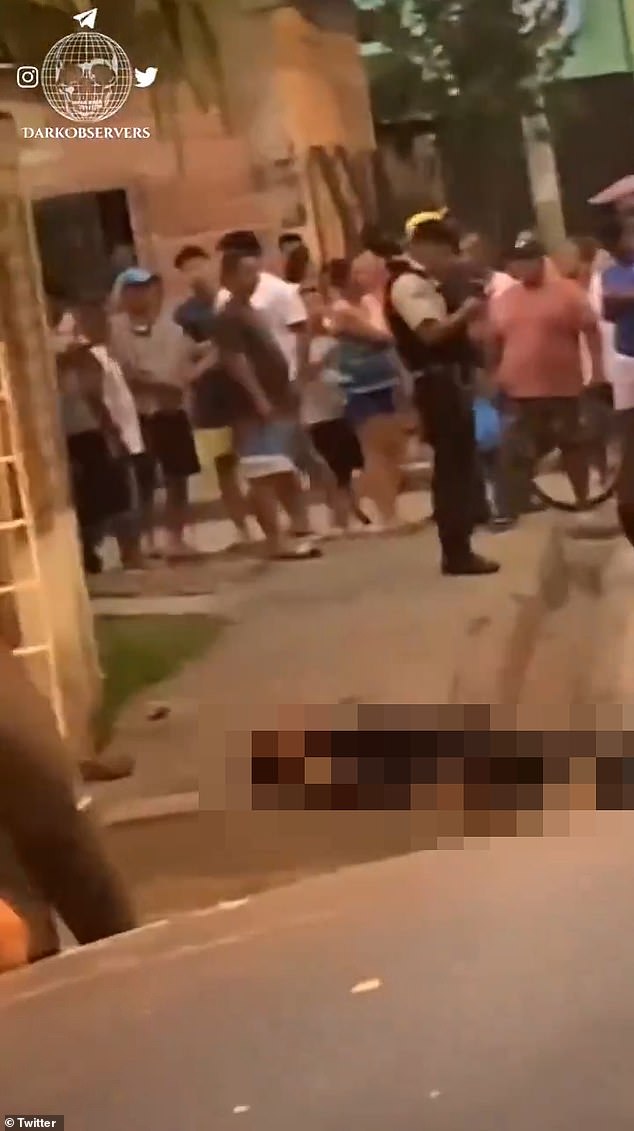
Footage from the conflict in early 2024 showed the body of a man, said to be a police officer, lying on the side of the road in a pool of blood. He appeared to have been shot in the head
With the state struggling to address the root of the problem – foreign demand for drugs and the appeal of such criminal careers against the alternatives – inter- and intra-cartel violence has spiralled.
A month after the arrests, the country erupted again with gang violence. Guards at La Regional prison in Guayaquil discovered early on January 7 that Los Choneros leader Adolfo Macias was not in his cell.
News quickly spread. Incarcerated gangsters across the nation began rioting. Guards were taken hostage and shot or, in some cases, hanged.
Beyond the prison walls, explosions rocked major cities. At least 10 people were killed in the first few days. Machete-wielding thugs threatened to execute anyone they found on the streets of Ecuador at night. Citizens took up arms to defend themselves.
One video showed the body of a man, said to be a police officer, lying on the side of the road in a pool of blood. He appeared to have been shot in the head.
The ‘civil war’ escalated when gang members wearing balaclavas stormed the state-owned TC Television in Guayaquil and pistol-whipped staff to the floor.
Images from the television studio were broadcast across the country, impossible to ignore. It seemed Ecuador was in the midst of a coup, or a civil war. Unchallenged, the gangsters brandished knives, dynamite and machineguns in a show of force.
Making clear who was in charge, gang members then shared footage of kidnapped officers as one was made to read a statement: You declared war, you will get war. You declared a state of emergency. We declare police, civilians and soldiers to be the spoils of war.’
A day later, Noboa declared a state of emergency, allowing the government additional powers. The army was sent in to take back the prisons. On January 9, he acknowledged the ‘internal armed conflict’ and ordered the army to ‘neutralise’ nearly two dozen gangs.
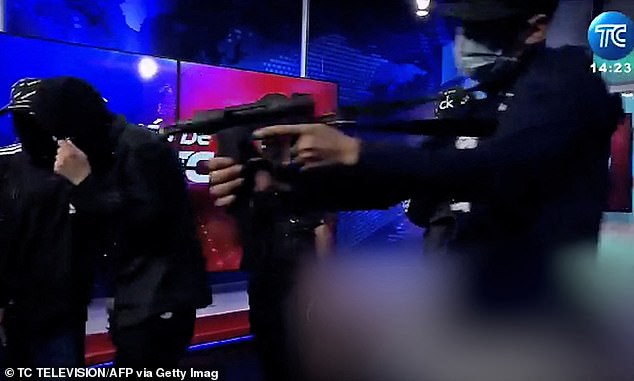
Armed men wearing balaclavas bursting into the studio of public television station TC in drug violence-torn port city of Guayaquil
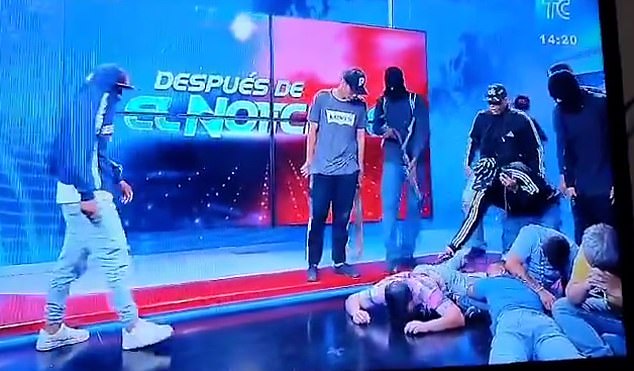
Men with their faces covered entered the set of the TC Television network in the port city of Guayaquil and shouted that they had bombs
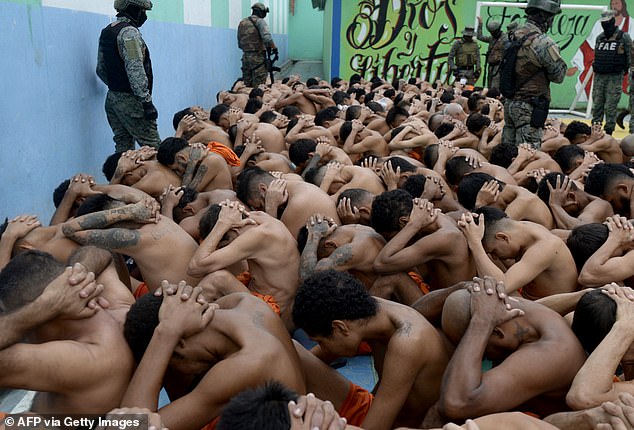
Armed soldiers stormed Ecuadorian prison, El Rodeo, on June 5, 2024 as they hunted for drugs and weapons within the compound
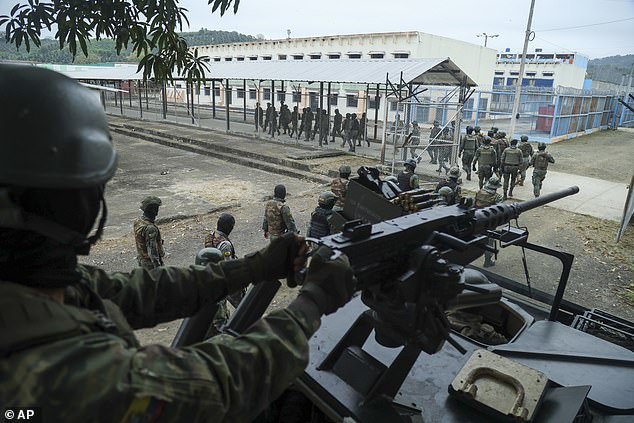
Soldiers entered El Rodeo prison to conduct a search amid a spiral of murders, in Portoviejo, Ecuador
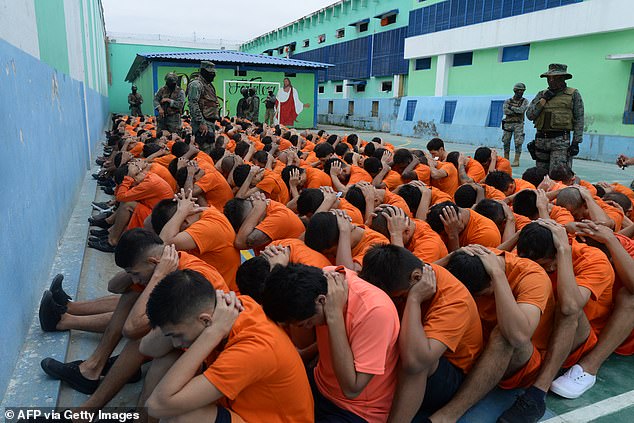
Inmates were pictured sitting on the ground with their hands behind their heads as military officials searched the prison
The first military operation was carried out in June in La Pradera after five people were murdered and another seven were left injured after an armed attack on May 20.
Days later, pictures emerged of military commanders raiding a prison and rounding up gang members in an effort to cleanse the facility of weapons and drugs.
Soldiers stormed the Manabi N4 Detention Centre in Poroviejo on June 5, 2024, took back control and posted photos of the inmates sat down in columns, reminiscent of Bukele’s boasts from the CECOT max security prison in Teoluca.
A permanent military presence was established in a third of the country’s 36 prisons as the military looked to restore order.
‘We are facing a very dangerous enemy, very prepared, well equipped and with a lot of economic power,’ said Defense Minister Gian Carlo Loffredo at the time.
Noboa’s position is not easy. Rights groups share their alarm at the ‘imminent risk’ to inmates inside the country’s prisons. Opposition politicians have said Noboa has led the country into ‘dictatorship’. He has been accused of surrounding himself with family and friends and contradicted by the central bank and IMF on promises to boost growth.
Breaking apart the gangs will require structural reform, offering viable career alternatives to citizens, and restoring the state’s monopoly on violence – a deterrent to any would-be militant groups. At present, Ecuador has the lowest growth estimates in South America; GDP fell for three consecutive quarters last year.
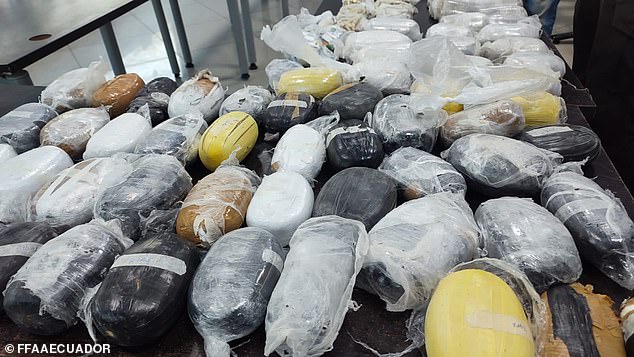
Pictured: Packaged drugs found during a search of the largest prison in Ecuador
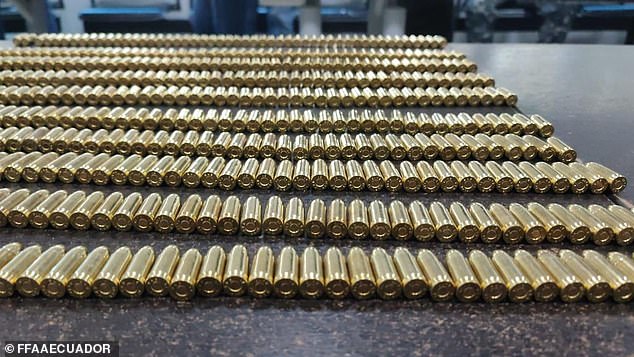
Bullets are seen lined up on a counter after they were found during a search of a prison
The pandemic made matters worse, turning hungry children and unemployed adults into easy recruits for criminal groups, with criminals demanding payments from businesses and terming the fee a ‘vacuna’ (vaccine) — as in immunity from crime.
‘COVID came and went and left us vaccines, but a different type of vaccines,’ said Holbach Muñeton, president of the National Federation of Provincial Chambers of Tourism of Ecuador.
Convenience stores, auto part shops and pharmacies have floor-to-ceiling metal bars that prevent customers from entering from the sidewalk. Malls have metal detectors at the entrances, and bars and restaurants have fewer tables and close early.
Belen Diaz, a resident at a gated community in Guayaquil, said she has adapted by carrying two phones – one main and one to hand over to thieves.
‘We don’t know who we’re friends with anymore,’ she said. ‘I’m going to stay single forever. I can’t go dating on these weird apps. I mean, imagine, they could kidnap me!’
Such uncertainty makes the task ahead a huge challenge. Gang violence will deter investment and opportunities for legitimate businesses to grow without fear of extortion, corruption or violence.
President Noboa promises to have the answers. But peace, still within living memory for most Ecuadorians, is still not clearly within reaching distance.







